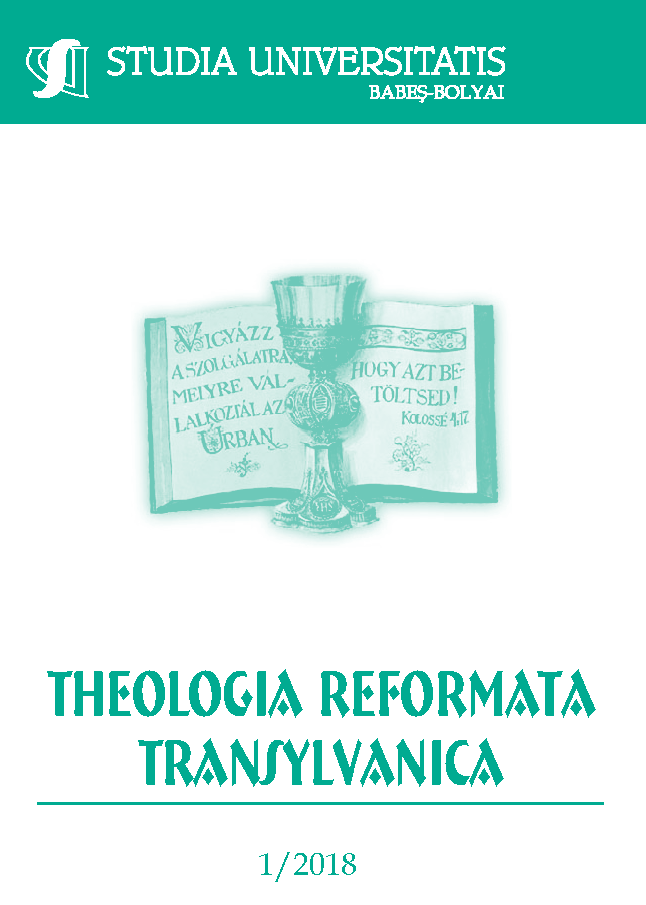Isten kertésze – a vallástanár személye
DOI:
https://doi.org/10.24193/subbtref.63.1.16Keywords:
the character and identity of religion teacher, credibility, authenticity, self-knowledge, self-understanding, lifelong learning, four-dimensional development (intellectual, physical, spiritual, emotional and social), personal example, ideal, role.Abstract
God’s Gardener – the Character of the Religion Teacher This topic is always an actual issue, every generation has to reconsider it. The present study tries to integrate and enumerate the relevant Hungarian Reformed literature referring to the subject. The most precious tool/instrument: In the religious education the relationship between the Holy Spirit, the pupil and the teacher is very significant. The latter acts like an important tool in God’s hand, playing a key role when it comes to answering the existential questions of the pupils. Two-sided approach: The religion teacher does not simply provide information through lessons, they encourage the right perception of God and the relationship with Him, thus their personal relationship with Him should be transparent, and loving kindness should describe how they treat children. “We are visible... we are being tracked, followed.” This subtitle is a quote referring to the exemplariness of the religion teachers. In an era of paradigm crisis this problem gets even more complex, what kind of patterns and ideals does a Christian school provide? The religion teacher should act like an ideal, an example which is authentic, honest and can admit their own failures. The two secrets of a good educationist: self-understanding and self-identity. Being a good teacher requires profound self-understanding viewing their past, and conscious self-development in the future, Christian 4 dimensional growth . Conclusion. The attitude of a religion teacher influences the social status of the church and judgment of the whole Christian community through the pupils. Devoted, committed teachers can make their work fruitful if they engage lifelong learning, while they teach they constantly acquire new knowledge and skills.References
Bottyán János: Hitünk hősei. A Református Zsinati Iroda Sajtóosztálya, Budapest, 1985.
Fazakas Sándor: „A lelkészi szolgálat körülményeinek változásai és a lelkésztovábbképzés”. In: Felelet a mondolata – Tanulmányok a 60 éves Bogárdi Szabó István tiszteletére, Budapest, Karoli Gáspár Egyetem – Pápai Református Teológiai Akadémia – L’Harmattan Kiadó, 2016.
Hendricks, Howard: Életformáló tanítás – Hét bevált módszer, amely életre kelti a tanítást (Eredeti: Teaching to Change Lives). Budapest, Keresztyén Ismeretterjesztő alapítvány, 2010.
Henley, Karyn: Gyermekbarát tanítás. Association of Christian Schools International Keresztény Alapítvány, Budapest, 2000.
„Hitből hitbe” – Kateketikai kézikönyv II., ADORJÁN József (szerk.), Budapest, Református Zsinati Iroda Sajtóosztálya, 1990.
Imre Lajos: Katechetika. A Magyar Református Egyház Kiadása, 1942.
Karácsony Sándor: Ocsúdó magyarság – Szokásrendszer és pedagógia. Budapest, Széphalom könyvműhely (1945), 2002.
Kassel, Maria: Tiefenpsychologische Anmerkungen zur Persönlichkeit des Religionslehrers. In: Religionslehrer – Person und Beruf. Hg.
Heimbrock, H.G, Göttingen, Vandenhoeck - Ruprecht, 1982.
Kelemenné Farkas Márta: Háromszemélyes társaslélektani viszony. In: Evangéliumi nevelés – lélekben és igazságban. A Katolikus, a Református és az Evangélikus egyház közös kiadványa, Bencés Kiadó, Pannonhalma, 1996. 215–223.
Simon András: Egyvonalban Istennel – önéletrajzi riportkönyv. Budapest, magánkiadás, é.n. Tamminen, Kalevi – Vesa, Laulikki – Pysiäinen, Markku: Hogyan tanítsunk hittant? – vallásdidaktika. Budapest, Evangélikus sajtóosztály, 2001.
Ulonska, Herbert: Rollenerwartungen der Schüler an ihre Religionslehrer. In: Religionslehrer – Person und Beruf, Hg. Heimbrock, H.G, Göttingen, Vandenhoeck–Ruprecht, 1982.
Downloads
Published
How to Cite
Issue
Section
License
Copyright (c) 2018 Studia Universitatis Babeș-Bolyai Theologia Reformata Transylvanica

This work is licensed under a Creative Commons Attribution-NonCommercial-NoDerivatives 4.0 International License.



